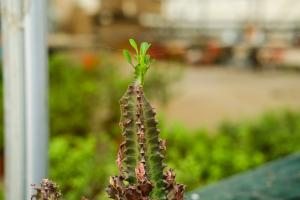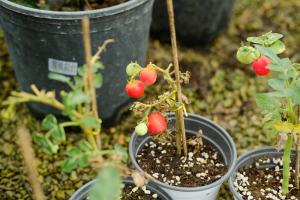Do Tomato Plants Close at Night?
Tomatoes are one of the most popular crops in the world. Whether grown in a backyard garden or commercially, they are a staple in many cuisines. However, one question that has puzzled many tomato growers is whether or not tomato plants close at night like flowers do.
The Basics of Plant Circadian Rhythms
Before we can answer this question, we must first understand the concept of circadian rhythms. This is the internal biological clock that governs many physiological processes in plants, including photosynthesis and growth. Circadian rhythms are regulated by a group of genes that guide the plant’s response to environmental cues like light and temperature.
These genes produce proteins that interact with each other in a feedback loop to produce a rhythm that lasts roughly 24 hours. This rhythm drives the plant’s daily activities and helps it adjust to changes in its environment.
A Tomato Plant’s Daily Rhythm
So, what does a tomato plant’s daily rhythm look like? During the day, tomato plants open their stomata to take in carbon dioxide and release oxygen in the process of photosynthesis. They are also able to absorb sunlight to fuel their growth.
As the sun sets, tomato plants do not close in the traditional sense. However, they do undergo a change in their physiological processes. As the light fades, photosynthesis naturally slows down. This leads to a decrease in the production of the energy-rich chemicals that the plant uses for growth.
Additionally, the tomato plant’s circadian rhythm triggers an increase in the production of certain enzymes that help it adjust to the darkness. These enzymes help break down the plant’s stored starches into sugars, which the plant can then use to continue growing through the night.
So, Do Tomato Plants Close at Night?
The short answer is no. Tomato plants do not have the ability to physically close like flowers do. However, they do undergo some significant changes in their physiological processes in response to the darkness.
Their circadian rhythm guides the plant’s growth and metabolism, helping it adjust to changes in its environment. As the sun sets and photosynthesis slows down, the plant’s metabolism shifts to focus on breaking down starches into sugars that the plant can use to continue growing through the night.
The Bottom Line
While tomato plants do not close at night, they do undergo significant changes in their physiological processes. Understanding the circadian rhythms that guide a tomato plant’s growth and metabolism can help gardeners and growers optimize their cultivation practices for the best possible yields.
Whether you’re growing tomatoes in your backyard or on a commercial scale, understanding the basic biology of this beloved crop can help you achieve better results and a healthier harvest. So, while tomato plants may not close their leaves at night, they are still fascinating and complex organisms that have much to teach us about the natural world.

 how many times do yo...
how many times do yo... how many planted tre...
how many planted tre... how many pine trees ...
how many pine trees ... how many pecan trees...
how many pecan trees... how many plants comp...
how many plants comp... how many plants can ...
how many plants can ... how many plants and ...
how many plants and ... how many pepper plan...
how many pepper plan...





























